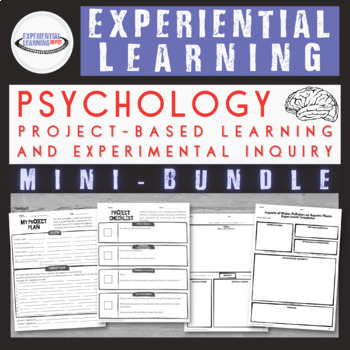Inquiry Based Lesson Plans for High School Psychology: Mini Bundle
- Zip

Products in this Bundle (2)
Description
Are you looking for inquiry based lesson plans for high school psychology that get your students actively engaged in the content? This self-directed, inquiry-based, psychology-themed mini-bundle has you covered.
This bundle includes two inquiry resources that go hand-in-hand. One is a self-directed project-based learning experience where each student chooses one psychologist (historical or present-day) to explore. Students will research the psychologist using the principles of project based learning. Because the experience is self-directed, students are given a series of opportunities to make choices in project design and process. The templates included in this resource guide students seamlessly through that process.
The second resource included in this bundle is a self-directed experimental inquiry tool kit. The tool kit includes templates that students use to design and conduct their own experiments on a psychology/human behavior topic of their choosing.
The idea behind the bundle is to get students thinking about psychological research by studying a psychologist and then being a psychologist themselves by carrying out their own experimental inquiry investigations.
Each of the resources in this bundle includes a digital and printable version. The resources in this bundle are not editable at this time.
Psychologist Project-Based Learning Resource Includes:
- Guidelines for teachers and students
- Research templates
- Project planning materials
- Project reflection
- Project based learning rubric
Student-Directed Experimental Inquiry Tool Kit Includes:
- Brainstorming activity
- Investigation/experiment templates
- Reflection questions
- Experimental inquiry rubric
- A printable and Google Slides digital version (the PDF is not editable)
If you like these resources, check out these as well:
- Introduction to Experimental Inquiry Design Workbook
- Self-Directed Project-Based Learning: Biographies
Try this free resource to help you manage these self-directed inquiry activities:
- Self-Directed Project-Based Learning Tools - PBL sample planner, PBL implementation spreadsheet, PBL outcomes digital portfolio
- Experiential Learning Activity Implementation Spreadsheet tools - this spreadsheet includes a page for managing experimental inquiry experiments. The checkpoints listed on the spreadsheet follow the student template included in the experimental inquiry tool kit.
Helpful Blog Posts:
- How to Scaffold Inquiry Experiences with More Questions
- Self-Directed Project-Based Learning in 7 Easy Steps
Interested in new resource alerts, freebies, tips, tricks, and more?
- Click the green star for new resource alerts
- Newsletter
- Blog
- Facebook.
- Experiential Learning Facebook Group
Earn TPT Credits:
Follow Experiential Learning Depot and earn TpT credits by giving feedback on this product. A sincere thank you for your business. Feel free to contact me through email at any time with questions on this product - experientiallearningdepot@gmail.com
Cover Font Credit: Mr. FISK Fonts





